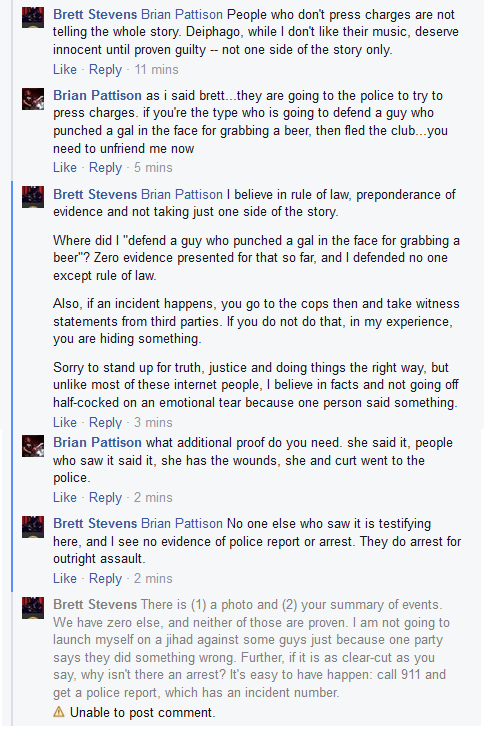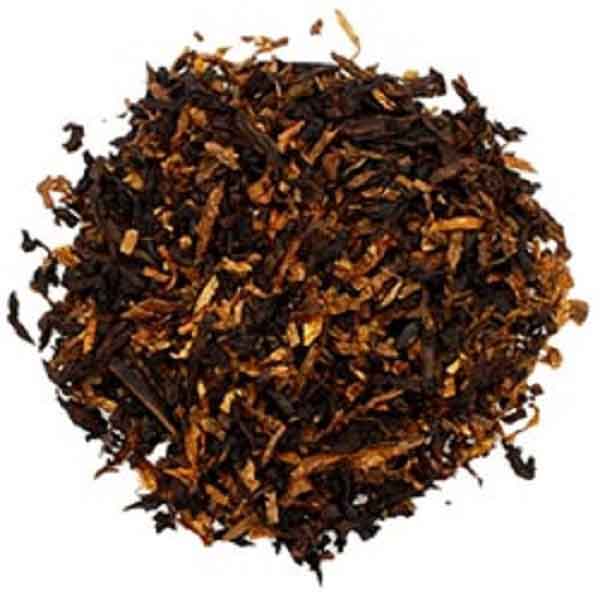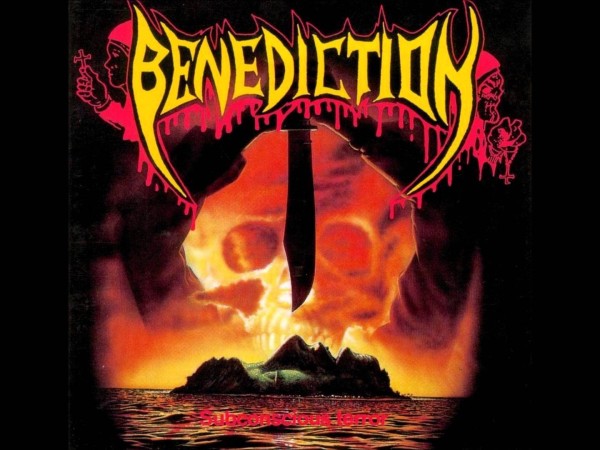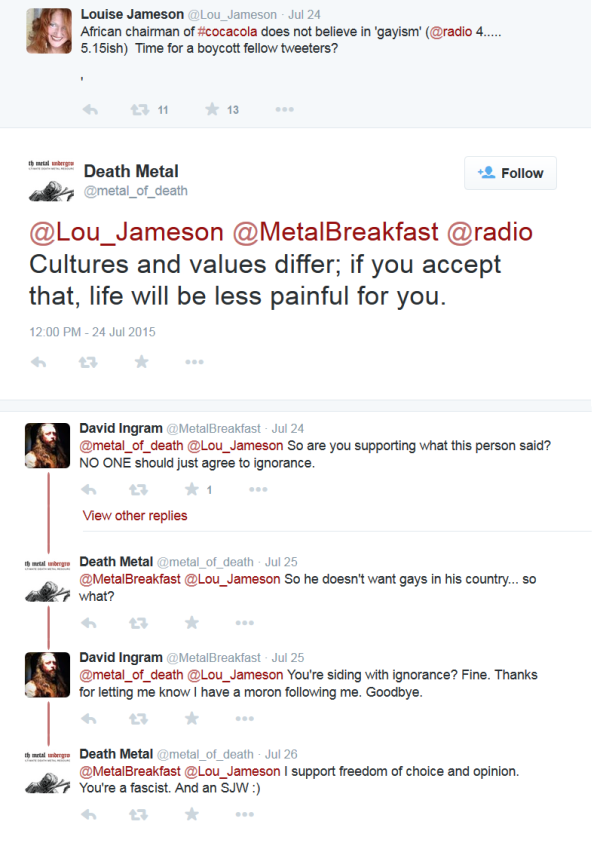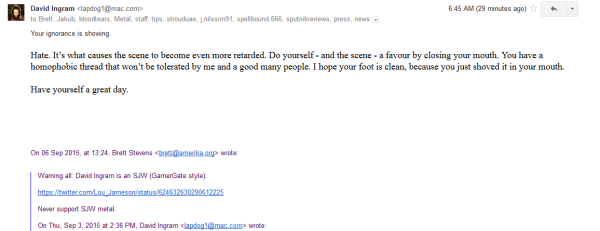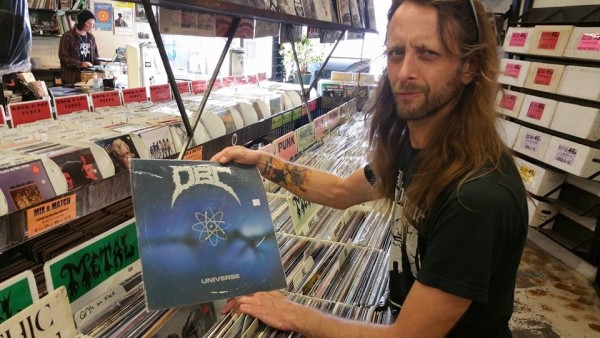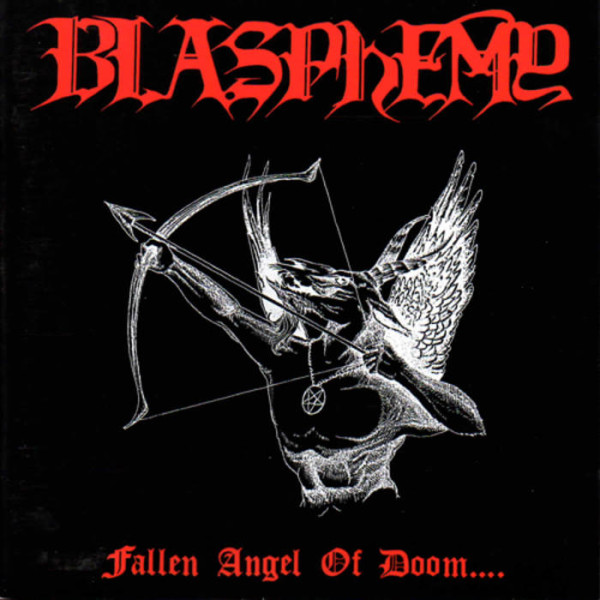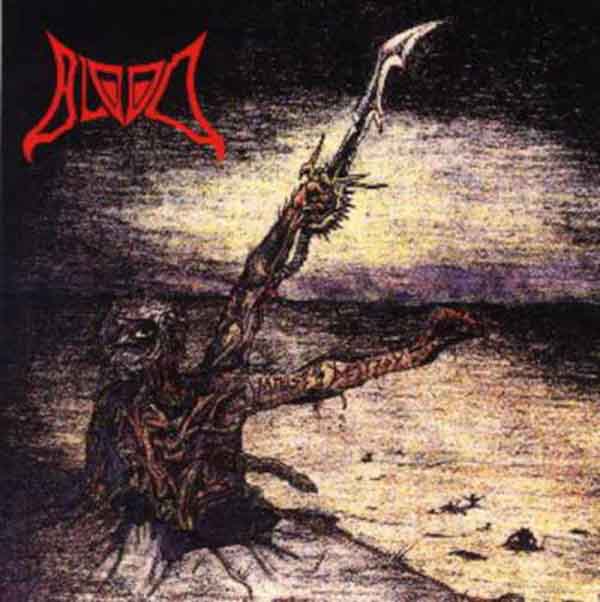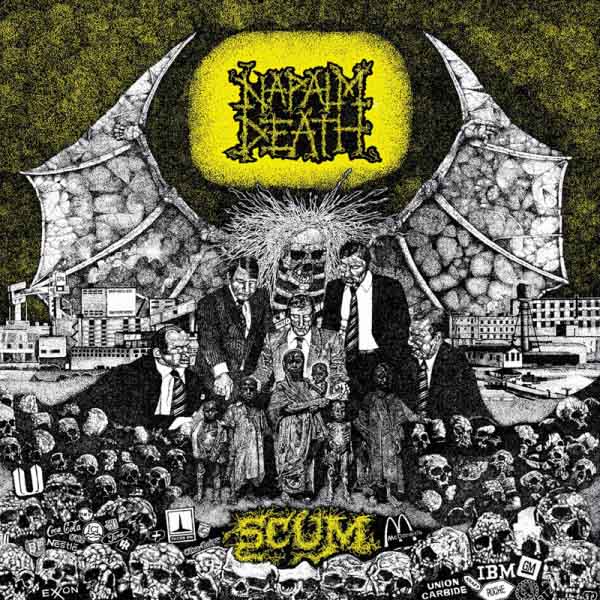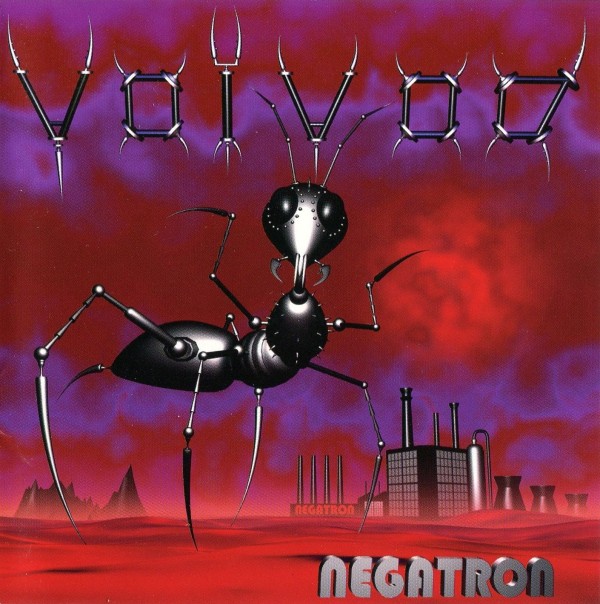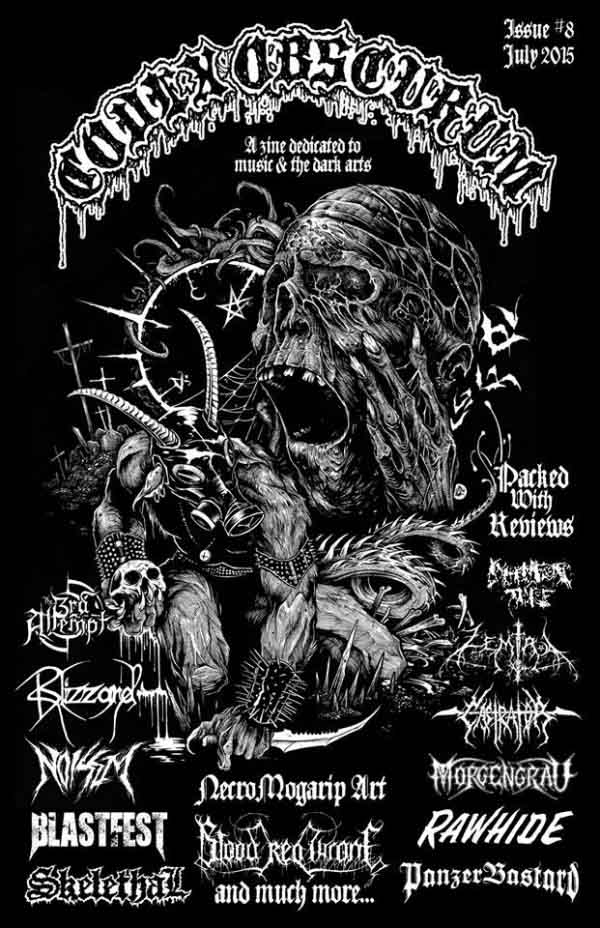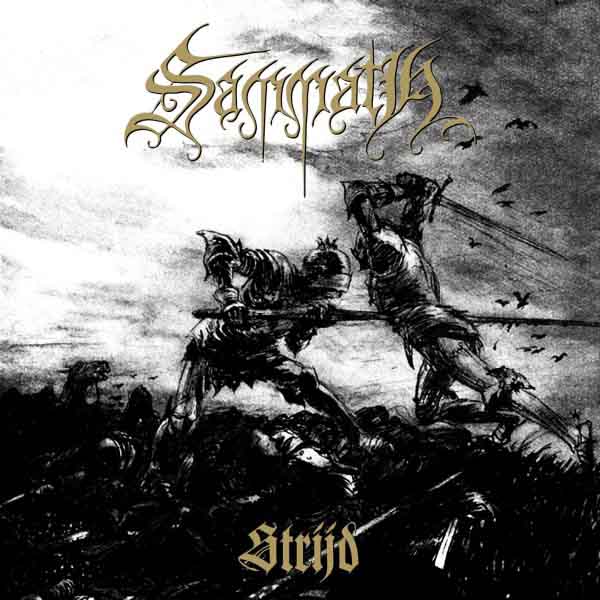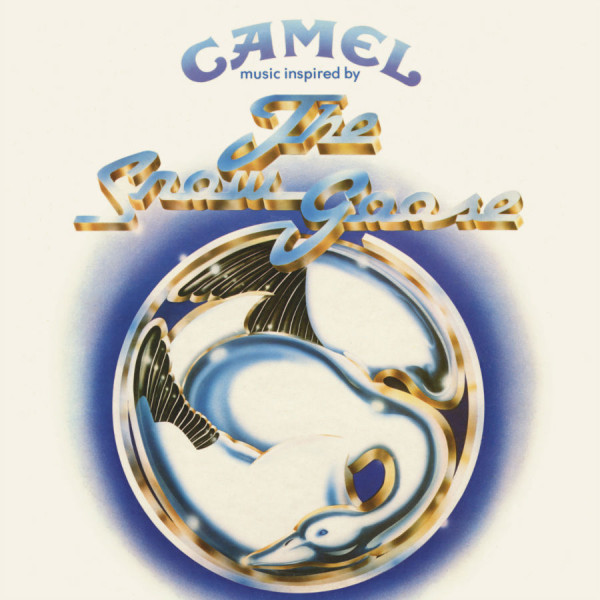
Angry hipsters are like discontented housewives: living in the midst of plenty, with any option open to them, they prefer to combine excuses for failure with a passive-aggressive attack on the world. It is as if they are seeking to justify their fedora-wearing, basement-dwelling ways in the face of the many possibilities they could have explored. Life peaks early for such people, and peaks low.
Last night’s debacle at the Hugo Awards, nominally granted for science fiction excellence, shows what happens when SJWs take over a genre: they kill it by replacing it with an inferior version of itself, and by doing so, drive away anyone interested in quality of art, music or literature. This parallels their infiltration of metal with terrible indie rock like Deafheaven, Necrophagist, BabyMetal and Wolves in the Throne Room.
They attack under the guise of humor. Remember Metalocalypse? It was Adventure Time with a butt-metal theme. Then they demand you be open minded, and spiritual, which showed up everywhere from the fruity New Age lyrics of Cynic through the recycle-your-cigarette-butts environmentalism of “Cascadian black metal.” Finally, they make the political demand: start preaching what we preach, or you are the enemy and must be destroyed.
They did the same thing in science fiction. This explains why the genre has fallen off the radar for the most part, since the “new classics” — coming on the heels of some execrable years of Fantasy hybrids — are all bad and meaningless. The days of Heinlein, Card, Asimov, Niven and other giants are removed from the present-day drivel. As writer John C. Wright described it:
Once, the Hugos were the popular award given to the best works by Frank Herbert, Robert Heinlein, Issac Asimov, Bob Silverberg, Ursula K LeGuin and Harlan Elison, and Roger Zelazny. After much patient effort, the Hugo Awards, together with the SFWA (the Science Fiction Writers of America) were controlled by a small clique of like minded creatures loyal to Mr. Hayden.
Thereafter, the Hugo voters awarded awards to the Tor authors Mr. Hayden selected based on their political correctness, and expelled those whose politics the clique found not to their taste.
None of this was done on merit. Editors and writers in the field have been silence or shoved to the sidelines thanks to the action of the clique. I mention no names in public, but those in the field recall the various false accusations leveled against numbers of people, both working for Tor and outside.
So, in effect, the Hugo Award became the Tor Award. It was given, over and over again, to works of modest merit (such as REDSHIRTS by John Scalzi) or none at all (“The Ink Readers of Doi Saket” by Thomas Olde Heuvelt) or selected solely on the grounds of their promoting political correctness or sexual abnormalities (“The Water That Falls on You from Nowhere” by John Chu).
We know this pattern: we’ve seen it!
Every month, the cozy little clique of labels and “journalists” prances out a new favorite which they claim is new because it “breaks down boundaries,” which actually means that it is indie rock music with metal grafted on top. Metal-flavored rock, in other words. That means that it is not new, or breaking barriers, but in fact reverting to what existed before metal and what many of us came to metal to escape, i.e. endless droning self-drama victimhood songs by bored people who never found anything worth giving a damn about in life.
The real story at the Hugo Awards is that the voting was corrupt: SJW hipsters were buying votes in an attempt to block all non-SJW authors from receiving awards. The whole point of being an SJW is to have a personal army, so that if you want to show the world how important you are, you can summon a whole horde of internet people to come forth from their basements and inundate whatever target you have selected. Then, you alter it — just like the SJW invasion of metal turned it into indie rock — and declare that it has “changed,” even though what has really happened was an invasion from outside.
Even WIRED magazine, normally pro-SJW like most media, noticed the clash. Its story looked in-depth at the SJW passive-aggressive phenomenon, where SJWs style themselves as anti-racist and accuse anyone who disagrees with them of — you guessed it — being racist. WIRED pointed out the origins of the backlash against this:
But from the start, Correia had some serious complaints. He felt that the Hugos had become overly dominated by what he and others call “Social Justice Warriors,” who value politics over plot development. Particular targets of Puppy derision include two 2014 Hugo winners: John Chu’s short story, “The Water That Falls on You From Nowhere,” in which a gay man decides to come out to his traditional Chinese family after the world is beset by a new phenomenon: whenever a person lies, water inexplicably falls on them; and Ann Leckie’s debut novel Ancillary Justice, whose protagonists do not see gender. Leckie conveys this by using female pronouns throughout.
Correia’s New York Times best-selling book Warbound was up against Leckie’s novel at the 2014 Hugos. (He thinks he was a finalist because of an earlier Sad Puppies lobbying effort.) He and Torgersen, a 41-year-old chief warrant officer in the Army Reserve who took over the Sad Puppies campaign this year, told me they want sci-fi to be less preachy and more fun. Both bristle at assertions made in the blogosphere that they are racist, sexist homophobes.
In fact, their argument is actually pretty interesting. They say their beef is more class-based; Torgerson says his books are blue-collar speculative fiction. The Hugos, they say, are snobby and exclusionary, and too often ignore books that are merely popular, by conservative writers. The Sad Puppies have a name for those who oppose them: CHORFS, for “Cliquish, Holier-than-thou, Obnoxious, Reactionary Fanatics.”
In other words, on one hand there are affluent college-educated MFA-attending SJWs who want to write stories about “social justice” and have an audience buy them for that reason alone. On the other hand are more traditional writers, who may not have come from a privileged background and who mostly lack a political agenda, but are writing based on content alone, and push ideology and style to the side. Their sin, according to SJWs, is not that they oppose SJW, but that they fail to make it the centerpiece of all of their works.
A cynic might see this in simple economic terms. SJWs in metal and science fiction want a captive audience: if the book talks about “social justice,” buy it like housewives picking up the latest Barbara Kingsolver book because they feel too guilty not to, and therefore SJWs always have a job. The non-SJW writers compete with this, so the SJWs want to exclude them from the scene, just like they have waged war on non-political bands in metal, claiming that denial of “social justice” beliefs equals rejection of the validity of the underlying issues those SJW beliefs purport to discuss. In other words: there is only one right way to think about these topics, and if you do not join the bandwagon, you are literally Hitler.
As in science fiction, the problem created by SJWs is not right vs. left but all of us who want a healthy genre versus those who want to take it over and use it as a zombie bullhorn for their own propaganda. We resisted it with Christians, and with the far-right, and now we must resist it with SJWs, because once they take it over it will never recover. SJWs implement a type of “soft censorship” where if journalists, they refuse to mention non-SJW bands in a positive light, and mention the SJW bands ten times more. If labels, they sign only SJW bands. The fans buy only SJW-approved material. The result creates a market that replaces metal as a whole and crowds out the original fans and new fans, attracting — and allowing in — only fellow traveler zombies. That is our future if we do not fight SJWs like we did Christian metal and the far-right in the 1990s.
44 CommentsTags: censorship, gamergate, hugo awards, metalgate, sjws


